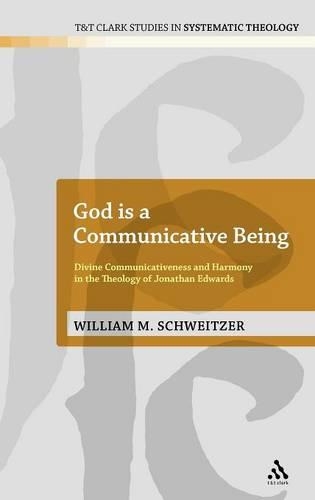
God is a Communicative Being: Divine Communicativeness and Harmony in the Theology of Jonathan Edwards
(Hardback)
Available Formats
Publishing Details
God is a Communicative Being: Divine Communicativeness and Harmony in the Theology of Jonathan Edwards
By (Author) Rev. Dr. William M. Schweitzer
Bloomsbury Publishing PLC
T.& T.Clark Ltd
29th March 2012
United Kingdom
Classifications
Tertiary Education
Non Fiction
Theology
Calvinist, Reformed and Presbyterian Churches
230
Physical Properties
Hardback
208
Width 156mm, Height 234mm
426g
Description
Over the past half century, there has been a proliferation of scholarship on the great American theologian Jonathan Edwards. However, the vast majority of this output confines itself to the details of his work. With some welcome exceptions, the forest has often been missed for the trees. In this ground breaking study William Schweitzer presents a new reading of Edwards: He starts with the question what is distinctive in Edwards' theology The answer comes in Edwards' insight into Trinitarian life. God is eternally communicative of his knowledge, love, and joy among the Three Persons of the Trinity, and this divine communicativeness was for Edwards the explanation for why God created the universe. More specifically, however, Edwards believed that God's communication carries with it the Trinitarian hallmark of "harmony." This hallmark is not always east to discern, even for the regenerate. Edwards' lifelong projectGCoas demonstrated by the common purpose of all three unfinished "Great Works"GCowas to interpret the harmony found in and among the several media of revelation.
Reviews
The concept of communion is central to Edwards' thought. Believers partaking in the eucharist shadow forth a greater communion of Christ and the church; regeneration is achieving communion with the Holy Spirit; and the very nature of God is communicative. God seeks to communicative Godself to creation and to perceiving being. This "unifying factor," William Schweitzer demonstrates in this new appraisal, helps to "explain Edwards": his doctrine of God and the Trinity, his theology of revelation, and the harmony of Scripture, nature, and history, all of which informed Edwards' "overarching project" of elucidating God's sovereign work of redemption.' - Kenneth Minkema, The Jonathan Edwards Center at Yale University, USA. -- Kenneth Minkema
Rigorously researched and lucidly written, this work highlights the unique combination of orthodoxy and originality which characterised the mind of Jonathan Edwards. It is immensely stimulating, and I hope it will prove a seminal work, encouraging further development of the core idea that God by his very nature communicates himself; and in doing so shares not only his knowledge and ideas, but also the love and joy which lie at the heart of his own trinitarian life.' - Donald Macleod, Free Church of Scotland College, UK -- Donald Macleod
This book helpfully uncovers Edwards's attention to harmony as an interpretive key (God's "calling card") to not only his doctrine of God but also providence and redemption. More importantly, it proposes "harmony" as Edwards's basic apologetic strategyone that convinces believers and unbelievers of the divine identity, and one that links God's inner nature (Trinitarian harmony) to his communicative efforts in history. These fresh arguments help us see the Edwards corpus from a new perspective by revealing a previously-obscured angle on what Edwards did and why he did it.' - Gerald R. McDermott, Roanoke College, USA -- Gerald R. McDermott
This is an important book, not because it offers a penetrating analysis of a specific theme found in Jonathan Edwardss theology, but because it presents a very readable overview of Edwardss entire theological project. William Schweitzers work is an admirable study which seeks to ascertain the overarching scaffolding that frames Edwardss thought. The book is clearly written and easy to understand. I recommend it to anyone seeking to grasp the central themes animating Edwardss theology ... It is eminently readable and a great place for theologians, pastors, and Christians to begin grappling with Edwardss theology as a whole. -- Robert W. Caldwell, III, Southwestern Baptist Theological Seminary, USA * Journal of Theological Studies (Vol. 64.2) *
Author Bio
Dr. William M. Schweitzer received his PhD from Edinburgh University, UK, and is an ordained minister in the Presbyterian Church of America, USA. He serves as the church planting minister of Gateshead Presbyterian Church in Northern England.
